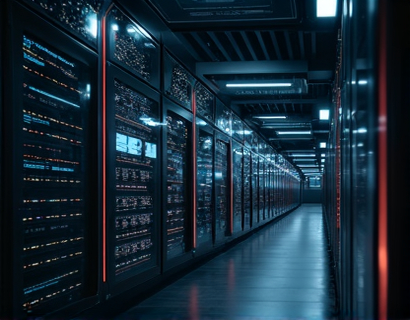Autonomous AI Agents: Revolutionizing Business Efficiency Through Multi-Chain and Cross-Technology Automation
In the rapidly evolving digital landscape, businesses are constantly seeking innovative solutions to enhance efficiency, reduce costs, and gain a competitive edge. One of the most transformative advancements in this realm is the emergence of Autonomous AI Agents, which are redefining the way companies operate by seamlessly integrating across multiple blockchains and technologies. These AI-driven agents are not just automating routine tasks; they are optimizing complex workflows, enhancing decision-making processes, and unlocking new levels of productivity.
The concept of Autonomous AI Agents revolves around the creation of intelligent, self-operating entities that can perform a wide range of tasks with minimal human intervention. These agents are designed to work across various platforms and technologies, including but not limited to blockchain networks, cloud services, and traditional enterprise systems. By leveraging advanced machine learning algorithms and natural language processing, these agents can understand, interpret, and execute complex instructions, adapt to new situations, and learn from past experiences.
Multi-Chain Integration
One of the most significant advantages of Autonomous AI Agents is their ability to operate across multiple blockchain networks. Blockchain technology, known for its transparency, security, and decentralization, has the potential to revolutionize various industries, from finance and supply chain to healthcare and beyond. However, the fragmented nature of different blockchain platforms often poses a challenge for businesses looking to leverage the full potential of this technology.
Autonomous AI Agents bridge this gap by providing a unified interface that can interact with multiple blockchains simultaneously. This multi-chain capability allows businesses to seamlessly move assets, data, and value across different blockchain ecosystems without the need for cumbersome and error-prone manual interventions. For instance, an AI agent can automatically transfer assets from one blockchain to another, execute smart contracts, and ensure compliance with regulatory requirements, all in real-time and with high accuracy.
Cross-Technology Automation
Beyond blockchain, Autonomous AI Agents are capable of integrating with a wide array of technologies to create a cohesive and efficient operational environment. These agents can interact with cloud computing platforms, Internet of Things (IoT) devices, enterprise resource planning (ERP) systems, and customer relationship management (CRM) tools, among others. By automating the flow of data and processes across these diverse systems, businesses can achieve a level of operational synergy that was previously unattainable.
For example, an AI agent can monitor inventory levels in real-time through IoT sensors, trigger automated purchase orders when stock falls below a certain threshold, and update the ERP system accordingly. This not only reduces manual workload but also minimizes the risk of human error, ensuring that business operations run smoothly and efficiently.
Enhancing Decision-Making with AI
Autonomous AI Agents are not just about automating tasks; they are also powerful tools for enhancing decision-making processes. By analyzing vast amounts of data from various sources, these agents can provide insights and recommendations that human analysts might overlook. Machine learning algorithms enable the agents to identify patterns, predict trends, and forecast outcomes with a high degree of accuracy.
In the context of business, this means that leaders can make more informed decisions based on real-time data and predictive analytics. For instance, an AI agent can analyze market trends, customer behavior, and internal performance metrics to suggest optimal pricing strategies, marketing campaigns, or product development paths. This data-driven approach to decision-making can significantly improve a company's competitive position and drive growth.
Use Cases in Various Industries
The versatility of Autonomous AI Agents makes them applicable across a wide range of industries. Here are a few examples of how these agents are transforming business operations:
- Finance: AI agents can automate trading processes, monitor compliance, and manage risk by interacting with multiple blockchain networks and financial systems. They can execute complex transactions, such as cross-border payments and asset transfers, with speed and accuracy.
- Supply Chain Management: In the supply chain, AI agents can track products from manufacture to delivery, ensuring transparency and traceability. They can automate inventory management, predict demand, and optimize logistics, reducing costs and improving service levels.
- Healthcare: AI agents can streamline patient data management, automate administrative tasks, and enhance diagnostic processes by integrating with various healthcare IT systems. They can also assist in drug discovery and personalized medicine by analyzing large datasets and identifying potential treatments.
- Manufacturing: In manufacturing, AI agents can monitor production lines, predict maintenance needs, and optimize resource allocation. They can integrate with IoT devices to gather real-time data, ensuring that operations run efficiently and any issues are addressed promptly.
These use cases demonstrate the broad applicability of Autonomous AI Agents and their potential to drive significant improvements in operational efficiency and strategic decision-making.
Challenges and Considerations
While the benefits of Autonomous AI Agents are clear, there are several challenges and considerations that businesses should be aware of when implementing these solutions:
- Integration Complexity: Integrating AI agents across multiple technologies and blockchain networks can be complex and requires expertise in both AI and the specific technologies involved. Businesses need to ensure they have the necessary technical capabilities or partner with experienced providers.
- Data Security and Privacy: Handling sensitive data across various systems increases the risk of security breaches. It is crucial to implement robust security measures and comply with data protection regulations to safeguard information.
- Regulatory Compliance: Different industries are subject to various regulations, and AI agents must operate within these frameworks. Businesses need to ensure that their AI solutions are compliant with relevant laws and standards.
- Cost Considerations: While AI agents can lead to long-term cost savings, the initial investment in technology and expertise can be significant. Businesses should conduct a thorough cost-benefit analysis to justify the implementation.
Addressing these challenges proactively can help businesses maximize the benefits of Autonomous AI Agents and avoid potential pitfalls.
Future Trends and Innovations
The field of Autonomous AI Agents is rapidly evolving, with ongoing research and development pushing the boundaries of what is possible. Some key trends and innovations to watch include:
- Advanced Machine Learning Models: The development of more sophisticated machine learning algorithms will enhance the capabilities of AI agents, enabling them to handle even more complex tasks and make more accurate predictions.
- Quantum Computing Integration: The emergence of quantum computing holds the potential to significantly boost the processing power of AI agents, allowing them to handle vast datasets and perform computations at unprecedented speeds.
- Autonomous Decision-Making: Future AI agents may achieve a higher level of autonomy, making decisions with minimal human oversight. This could lead to more efficient and responsive business operations.
- Interoperability Standards: The creation of standardized protocols for multi-chain and cross-technology integration will make it easier for AI agents to operate across diverse environments, fostering greater adoption and collaboration.
These advancements will continue to drive the evolution of Autonomous AI Agents, making them even more powerful and versatile tools for businesses looking to stay ahead in the digital age.
In conclusion, Autonomous AI Agents represent a significant leap forward in business efficiency and operational excellence. By seamlessly integrating across multiple blockchains and technologies, these agents automate complex tasks, optimize workflows, and provide valuable insights through advanced analytics. As businesses increasingly adopt these solutions, they will not only streamline their operations but also gain a competitive edge in an ever-changing market. Embracing Autonomous AI Agents is no longer an option but a necessity for companies aiming to thrive in the digital landscape.










































